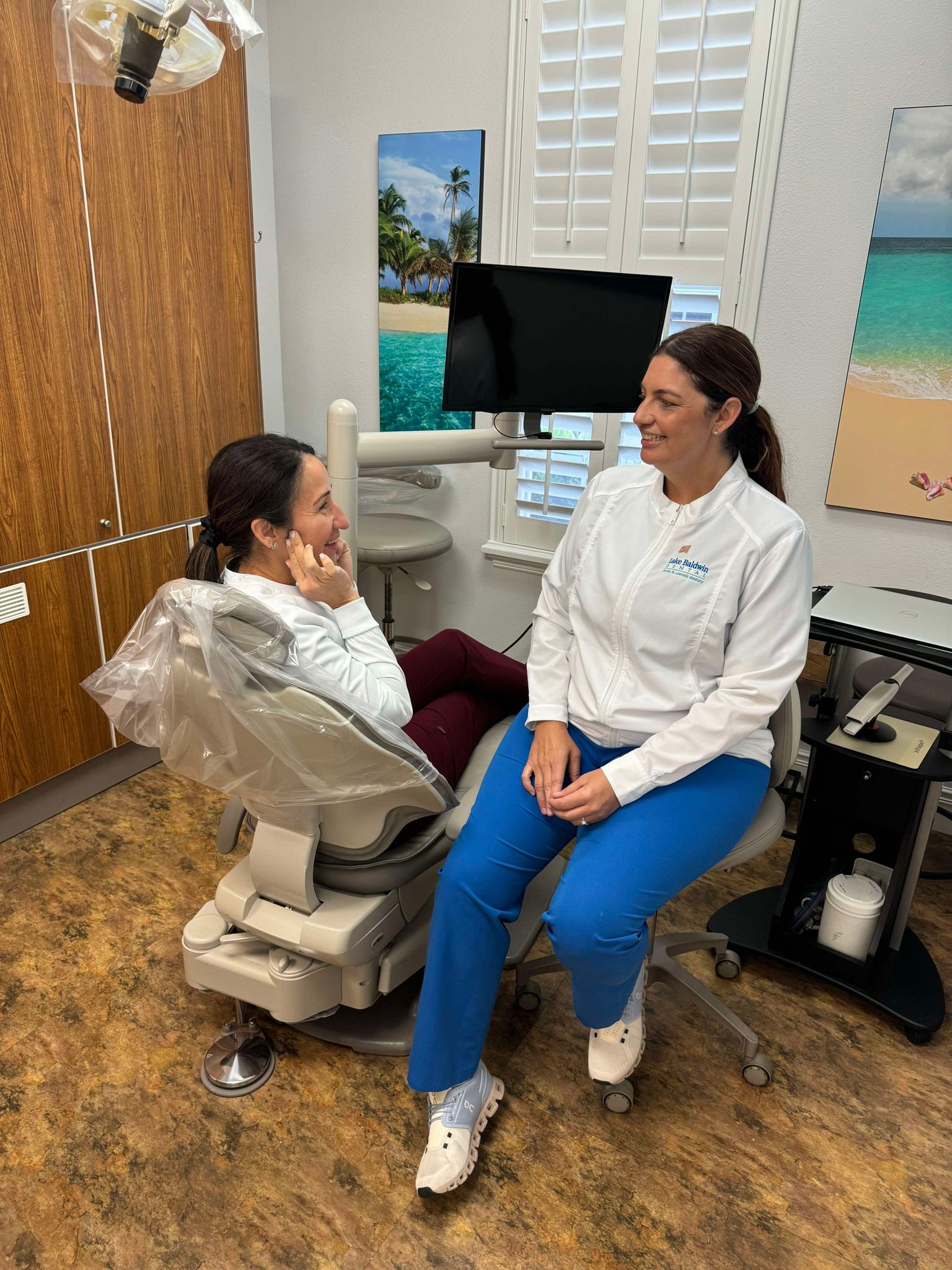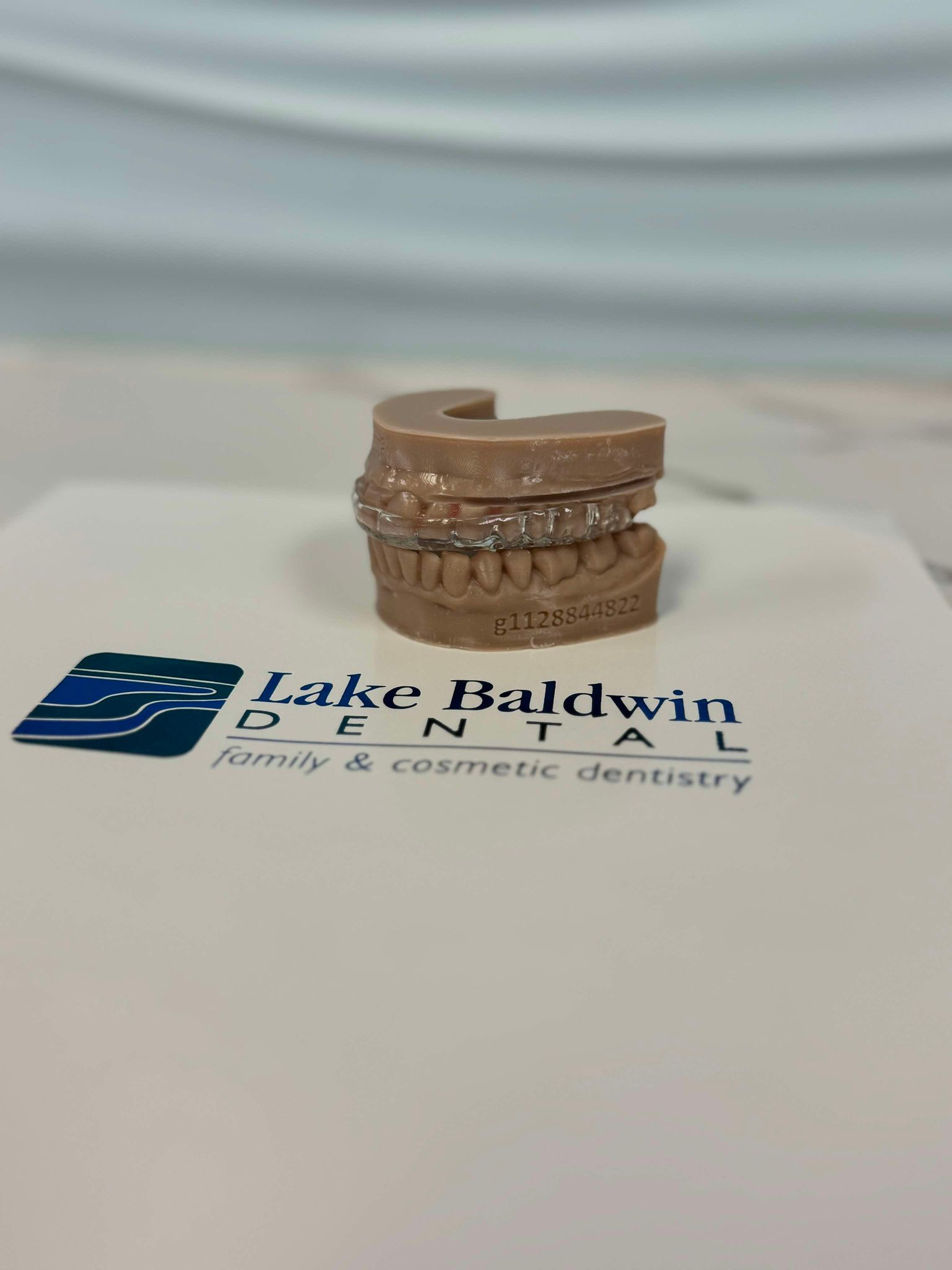November is TMJ Awareness Month, and at Lake Baldwin Dental, we want to help our Orlando community understand more about TMJ disorders and how they can affect your everyday life. TMJ stands for the temporomandibular joint, which connects your jaw to your skull. This joint plays a big part in simple movements, like talking, eating, and even yawning! When something isn’t right with this joint, it can lead to pain, discomfort, and other issues that affect daily life. Let’s dive into what TMJ disorders are, what to look out for, and how we can help.
What Is TMJ?
The temporomandibular joint (TMJ) is the joint that allows your jaw to move smoothly when you open and close your mouth, like when you’re talking, chewing, or laughing. This joint has several components:
- A rounded bony protrusion at the back of the lower jawbone
- The depression on the underside of the cheekbone where the lower jawbone sits
- A pad of cartilage similar to what’s in your knee that allows these bones to move smoothly
- Several muscles that control the opening and closing of the jaw
When this joint doesn’t work properly, you may develop a TMJ disorder, also called TMD. TMD may involve damage to the pad of cartilage, changes to the shape of the bones inside the jaw joints, or problems with the chewing muscles.
People with TMD often feel pain in their jaw, head, or face, and it can make daily activities harder and even painful.

What Are Warning Signs of TMJ Disorders?
How do you know if you might have TMJ disorder? Here are some common signs to look out for:
- Jaw pain or soreness: Pain can be in your jaw or around your ears.
- Clicking, grinding, or popping sounds: You may hear these when you open or close your mouth.
- Headaches or earaches: TMJ issues can cause pain that feels like a headache or an ear infection.
- Facial soreness: You might notice tension or aching in your face, especially around the cheeks and temples.
- Tooth sensitivity: Grinding and clenching, which are associated with TMJ issues, can make your teeth feel sensitive and even cause gum recession, leading to further sensitivity.
- Locked jaw: In severe cases, the jaw may become stuck, usually in an open position.
These symptoms can come and go or be constant, and stress can make them worse. If you notice any of these symptoms, it’s a good idea to talk to a dentist about it.
What Causes TMJ Disorders?
TMJ disorders can happen for different reasons, but here are some common causes and risk factors:
- Jaw injury: An injury to the jaw or face can damage the TMJ.
- Arthritis: Arthritis in the TMJ can cause pain and stiffness.
- Grinding or clenching teeth: Also known as bruxism, this can wear down the joint over time.
- Misaligned bite: If your teeth don’t line up properly, it can strain the TMJ.
Stress can also play a role, since people under stress might clench their jaws without even realizing it. Practicing stress relief can be helpful for both preventing and managing TMJ issues.
How Are TMJ Problems Fixed?
The good news is there are different treatments for TMJ disorders, so you’ll be able to get customized attention for your specific needs and situation. At Lake Baldwin Dental, we focus on non-surgical options first, as they’re effective for many people. Here are some treatments we might suggest:
- Lifestyle changes: Avoid chewing gum or hard foods that put extra strain on your jaw.
- Physical therapy: Exercises to stretch and strengthen the jaw can help reduce tension.
- Medication: Over-the-counter pain relievers or anti-inflammatory medications can help with pain and swelling. We may also be able to provide a prescription in some cases that can help to relax the jaw muscles
- Oral appliances: A custom mouth guard or splint can keep you from grinding or clenching your teeth, giving your TMJ a break.
In rare cases, surgery might be necessary if the problem is severe, but that’s usually only recommended when other treatments haven’t worked. We partner with oral surgeons and TMJ specialists who can provide advanced solutions if needed. They may be able to provide Botox, steroid injections, or other types of therapy before resorting to surgery.

Early TMJ Treatment Matters
The sooner you address TMJ symptoms, the better! Early treatment can help prevent symptoms from getting worse. Left untreated, TMJ disorders can lead to more pain and stiffness, making it harder to eat or even speak comfortably.
Although some people experience isolated, temporary acute joint issues that can be resolved quickly, most TMJ disorders are progressive issues that tend to become worse over time. In some cases, the cartilage in the joint may be partially or completely torn, or the bones of the joint may become worn down, causing permanent issues. By getting help early, you can keep symptoms from interfering with your day-to-day life and enjoy better jaw health in the long run.
Let’s Take Care of Your Jaw Joints This TMJ Awareness Month!
If you or someone you know is experiencing jaw pain, popping sounds, or any of the symptoms mentioned above, it’s time to take action. This November, make TMJ health a priority! At Lake Baldwin Dental, we’re here to help you find relief and get back to living without jaw pain with non-surgical TMJ treatments in Orlando, FL. Give us a call or schedule a consultation to learn more about TMJ disorders and how we can help you feel better.
Taking care of your TMJ health now can make a big difference in the future. Share this information with friends and family to spread the word this TMJ Awareness Month so you can keep smiling with a healthy jaw, Orlando!

